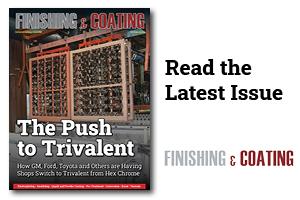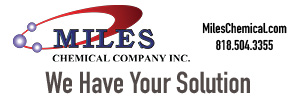ISO compliance has become essential for businesses seeking to establish credibility, improve operational efficiency, and meet stringent regulatory requirements.
 Alkesh PatelAchieving ISO certification, whether for quality management (ISO 9001), environmental standards (ISO 14001), or other industry-specific certifications, requires manufacturers to implement structured processes that ensure consistency, traceability, and quality across their operations.
Alkesh PatelAchieving ISO certification, whether for quality management (ISO 9001), environmental standards (ISO 14001), or other industry-specific certifications, requires manufacturers to implement structured processes that ensure consistency, traceability, and quality across their operations.
One of the most effective ways to achieve and maintain ISO compliance is through a robust Manufacturing ERP system. This article delves into how some enterprise software, specifically designed for surface finishing operations, can help manufacturing companies achieve ISO compliance and sustain it through best practices.
What is ISO Compliance and Why is It Important?
ISO (International Organization for Standardization) develops globally recognized standards that set guidelines for manufacturing processes, quality management systems, environmental sustainability, and more.
ISO compliance demonstrates that a company meets specific consistency, safety, and quality criteria.
Why Use Manufacturing ERP for ISO Compliance?
A Manufacturing ERP (Enterprise Resource Planning) system streamlines all facets of a company’s operations, providing a single integrated platform for managing production, inventory, quality control, reporting, and compliance. By leveraging the capabilities of a purpose-built ERP, manufacturers can simplify the process of meeting ISO standards while enhancing operational performance.
The key benefits of using a manufacturing ERP to support ISO compliance include:
- Centralized Documentation – ERP systems ensure that all necessary documentation is maintained in a centralized, accessible platform, allowing auditors to easily verify compliance.
- Real-time Monitoring—ERP software tracks and monitors production and quality metrics in real time, ensuring issues can be addressed promptly.
- Consistency in Processes – An ERP standardizes processes across different departments, reducing errors and ensuring consistent adherence to ISO requirements.
- Automated Reporting – Automating the generation of reports reduces the chances of human error and ensures compliance data is always up to date and available for audits.
Best Practices for Achieving ISO Compliance with Manufacturing ERP
1. Standardize Workflows and Processes
ISO standards require clear, consistent processes to ensure quality and reliability. An ERP tailored to surface finishing operations allows manufacturers to standardize workflows, ensuring each step in the production process meets the required specifications. This not only aids in compliance but also boosts operational efficiency.
By creating process templates enforced across the organization, manufacturers can ensure that everyone follows the same procedures, reducing the likelihood of deviations that could lead to non-compliance.
2. Automate Documentation and Record Keeping
ISO compliance demands rigorous documentation of procedures, inspections, and results. With an ERP system, businesses can automate much of this documentation, ensuring that every transaction, process, and quality check is recorded and easily accessible. This automation minimizes the risk of errors and makes it easier to provide the necessary documentation during ISO audits.
For example, quality control data can be automatically logged and linked to specific batches or production runs, offering the traceability critical for ISO 9001 compliance.
3. Real-time Quality Control and Inspection Management
An effective Manufacturing ERP system integrates quality control into every production stage, allowing real-time inspection management. One ERP offers integrated quality management tools that enable manufacturers to set inspection points, record inspection data, and trigger corrective actions when necessary.
Real-time tracking and alerts allow manufacturers to catch and address defects or process deviations before they impact the final product. This ensures adherence to ISO quality standards without compromising production speed.
4. Regulatory Compliance Tracking
Surface finishing operations often involve hazardous materials and complex environmental regulations, making compliance with ISO 14001 critical for many companies. An ERP helps manufacturers track environmental metrics, manage hazardous substances, and maintain compliance with environmental regulations.
By centralizing compliance data and automating reporting, PROPLATE™ ensures that manufacturers can easily demonstrate their adherence to environmental standards and maintain compliance with evolving regulations.
5. Improve Traceability with Batch and Lot Control
ISO standards emphasize the importance of traceability, especially in industries where products must be tracked through multiple stages of production. Some ERPs offer robust batch and lot tracking capabilities, ensuring that each product can be traced from raw material sourcing to final delivery. This functionality is critical for demonstrating compliance with both ISO standards and customer-specific requirements.
Tracing products back through the supply chain allows manufacturers to take swift corrective action and provide detailed traceability reports to auditors in the event of a product recall or quality issue.
6. Training and Employee Competence Tracking
ISO compliance requires manufacturers to ensure that employees are trained and competent. A few ERPs include tools for tracking employee certifications, training records, and competence levels, ensuring that staff are fully equipped to perform their duties in compliance with ISO standards.
Regular audits and re-certifications can be automated, ensuring that staff training remains current and that gaps in knowledge or compliance are quickly identified and addressed.
Conclusion
Achieving ISO compliance in manufacturing is no small feat, but it becomes significantly more manageable with the right tools. With its tailored focus on surface finishing operations, an ERP offers a powerful platform for achieving and maintaining ISO standards. By integrating all aspects of production, quality control, and compliance management into a single system, the ERP ensures that manufacturers can easily meet ISO requirements while driving operational excellence.
Alkesh Patel is the President of ProPlate, an ERP software program that helps shops and facilities improve their surface-finishing processing efficiency and precision. For more information, visit https://proplate.pro.



































